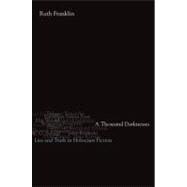
What is included with this book?
| Introduction: The Anvil and the Crucible | p. 1 |
| The Witnesses | |
| Angry Young Man | p. 23 |
| The Alchemist | p. 45 |
| The Kabbalist in the Death Camps | p. 69 |
| The Antiwitness | p. 89 |
| The Bird Painter | p. 103 |
| Child of Auschwitz | p. 121 |
| Those Who Came After | |
| A Story for You | p. 143 |
| The Ghost Writer | p. 163 |
| The Effect of the Real | p. 183 |
| Willing Executioners | p. 199 |
| Identity Theft: The Second Generation | p. 215 |
| Conclusion: The Third Generation | p. 235 |
| Index | p. 245 |
| Table of Contents provided by Ingram. All Rights Reserved. |
The New copy of this book will include any supplemental materials advertised. Please check the title of the book to determine if it should include any access cards, study guides, lab manuals, CDs, etc.
The Used, Rental and eBook copies of this book are not guaranteed to include any supplemental materials. Typically, only the book itself is included. This is true even if the title states it includes any access cards, study guides, lab manuals, CDs, etc.